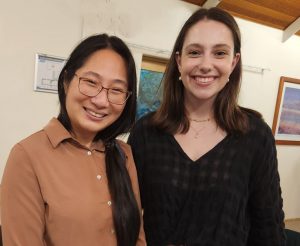After Stabilisation: Future Challenges in Australia-China Bilateral Relations
On Tuesday 28 November 2023, the Institute welcomed inaugural AIIA/China Matters Fellow Yun Jiang to speak about future challenges and opportunities in the Australia-China relationship.
Yun made a series of first-hand observations from a recent trip to China supported by the AIIA and China Matters. With the lifting of Covid-19 border restrictions, many Chinese-Australians have had the chance to return to China to see family and friends. Domestic tourism has flourished and academic exchanges have returned, creating more opportunities for in-person engagement with Chinese academics.
But while some things have reverted to normal, China emerges from the pandemic with several challenges ahead. Consumer confidence has not reached pre-pandemic levels, cost of living pressures are rising, and hyper-competition is making it increasingly difficult for young people to find a job. Growing intergenerational inequality because of economic involution has shaken the foundations of the Chinese dream, and the declining profitability of Chinese businesses—not to mention the resulting drop in foreign investment—has not helped.
Yun remarked that there were noticeably fewer non-Chinese people in major cities like Shanghai and Beijing. The joint forces of nationalism, self-reliance, anti-espionage and xenophobia may be creating a somewhat suspicious, less welcoming atmosphere for foreign visitors and investors.
During her trip, Yun interviewed several people on Sino-Australian bilateral relations, seeking to understand what China thinks about Australia and why. Although public opinion is generally positive (especially in the wake of Prime Minister Albanese’s November visit), international relations scholars exhibit greater pessimism, believing Australia’s lack of an independent foreign policy casts shadows on the long-term success of the bilateral relationship. Several Chinese analysts see war as inevitable. This is closely tied to a long-running victim narrative in China, in which the country sees itself as a casualty of US containment.
Yun asked how China could possibly see itself as a victim when it has become so powerful. Some argue privately that China’s projected image is false. But the more popular narrative—and the one peddled by the CCP—is that China chooses not to be a hegemon. In this version of events, China can sit comfortably in the position of pacifist. It isn’t ready to acknowledge the effect on its image of its actions, for example in the South China Sea.
Understanding China’s shifting economy and attitude towards conflict is important because of what Yun sees as the growing enmeshment of economics and security. This has critical ramifications for the Australian-Chinese relationship, especially as China strives for self-reliance in food production, defence and technology, while Australia pursues a policy of ‘friend-shoring’ with its traditional allies. Suspicion and self-censoring in both China and Australia over the last few years have further damaged the bilateral relationship, with people less willing to be the links between the two countries.
Yun’s findings suggest that maintaining the Australian-Chinese relationship will be difficult but not impossible. We must avoid being fatalistic, recognising that relationships can change. Responding rationally to the actions of other countries and thinking beyond the narrow lens of national interest can help secure relationships in the long term. Australia could act unilaterally to resist the pull of securitisation and focus instead on building mutual trust with China, encouraging more nuance in public debate and supporting independent, evidence-based research that may help normalise relations.
Asked about the standing of Australian-made products, Yun remarked that the Australian brand is still widely respected in China, although domestic brands (especially in the tech sector) are becoming increasingly sought after. The case of higher education seems to be similar. Many government positions are being filled by candidates wholly educated in China. However, many people—especially women—still want to study overseas because of the rankings of overseas universities, and to escape rigid gender expectations back home.
Other questions from the audience related to discrimination against Chinese Australians, Chinese attitudes towards AUKUS, the risks of speaking publicly about politics and the future of the Belt and Road Initiative, which is evolving in response to geopolitical and economic changes.
When asked whether the security of the Chinese-Australian relationship might be guaranteed by close trade links between the two countries, Yun warned that fear is traditionally a bigger driver than greed. But she was quick to admit that her pessimism may be the product of a few too many years spent in international affairs.
Report by Imogen Biggins, AIIA NSW Intern

Yun Jiang and Imogen Biggins